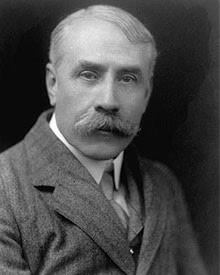Programme Notes
Wolfson College, Cambridge Friday 12th May, 21:00

Programme
Everyone Sang – Bernard Hughes
Il Est Bel Et Bon – Pierre Passereau
Chant Des Oyseaulx – Clément Janequin
El Cant Dels Ocells – Catalan Traditional arr. A Datta
Sumer Is Icumen In – attr. W. de Wycombe
Vagh’Amorosi Augelli – Maddalena Casulana
Per Lei Pos’in Oblio – Maddalena Casulana
Come Fra Verd’Erbette – Maddalena Casulana
Good Morrow – Agnes Zimmerman
Gone Forever – Agnes Zimmerman
The Owls – Edward Elgar
Two Pewits – Howard Skempton
The Nightingale – William Byrd
Like As The Doleful Dove – Thomas Tallis
Be Like The Bird – Abbie Betinis
A La Claire Fontaine – French Traditional arr. Bertold Breig
I Am The Song – Bernard Hughes
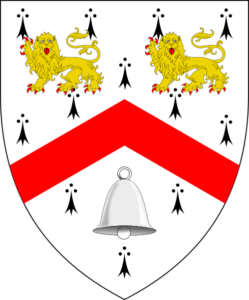
Text and Comment
Everyone Sang
Everyone suddenly burst out singing;
And I was filled with such delight
As prisoned birds must find in freedom,
Winging wildly across the white
Orchards and dark-green fields; on – on – and out of sight.
Everyone’s voice was suddenly lifted;
And beauty came like the setting sun:
My heart was shaken with tears; and horror
Drifted away… O, but Everyone
Was a bird; and the song was wordless; the singing will never be done.
Words: Siegfried Sassoon (1886-1967)
Music: Bernard Hughes (b.1974)
from Two Choral Fantares
Sassoon uses simple, evocative imagery to express his joy at the ending of World War I.
Hughes’ jubilant setting takes an equally straightforward, honest approach to tracing the themes of delight and hope through simple rhythms and bright harmonies. Listen for the freewheeling of the birds winging across the dark green fields, and the settling of the piece with the setting sun.
‘Everyone Sang’ is one half of the Two Choral Fanfares that bookend our programme tonight.
Il Est Bel Et Bon
Modern French
«Il est bel est bon, commère, mon mari»
Il était deux femmes toutes d’un pays,
Disant l’une à l’autre:
«avez bon mari»
«Il ne me courrouce ne me bat aussi,
Il fait le ménage,
Il donne aux poulailles,
Et je prends mes plaisirs.
Commère c’est pour rire
Quand les poulailles crient».
Co co co co de,
petite coquette, qu’est ceci
«Il est bel est bon, commère, mon mari»?
Music: Pierre Passereau (1509 – 1547)
English Translation
“Girl, my husband is handsome and fine,”
Two women from the same village were
Saying one to the other,
“Do you have a good husband?”
“He doesn’t scold me, or beat me either.
He does the chores,
He feeds the chickens
And I take my pleasure.
Girl, you have to laugh
to hear the cries of the chickens,
Co co co co de,
‘Little flirt, what is that?'”
“Girl, my husband is handsome and fine!”
Passereau was one of the most popular composers of the Parisian style chanson, ribald vernacular songs replete with double entendre, onomatopoeia, obscenity and patter. This most famous of his works pokes fun at the rustic chatter of two village women, as one boasts of the virtues of her husband to another. The sound of their gossip blends with the sound of the poultry, and we are left to decide for ourselves whose clucking it is we are listening to!

Le Chant des Oyseaulx
French
Reveillez vous, cueurs endormis,
Le dieu d’amours vous sonne.
A ce premier iour de may,
Oyseaulx feront merveilles,
Pour vous mettre hors d’esmay
Destoupez voz oreilles.
Et farirariron ferely ioly
Vous serez tous en ioye mis,
Car la saison est bonne.
Vous orrez, à mon avis,
Une doulce musique
Que fera le roy mauvis,
Le merle aussi,
Lestournel sera parmy,
D’une voix autentique:
Ti, ti py ti,
Que dis-tu?
Le petit sansonnet de Paris.
Le petit mignon
Saincte teste Dieu!
Il est temps d’aller boire.
Au sermon ma maistresse.
A saint Trotin
Voir saint Robin,
Monstrer le tetin,
Le doulx musiquin!
Quio, Tost, tost, au sermon, din, dan
Sus, ma dame, à la messe
Sancte Caquette
Guillemette Colinette,
il est temps d’aller boyre
Qu’est là bas passe, villain.
Saige courtoys et bien apris,
Il est temps, que di tu.
Rire et gaudir c’est mon devis,
Chacun s’i habandonne.
Rossignol du boys ioli,
A qui la voix resonne,
Pour vous mettre hors d’ennuy
Vostre gorge iargonne:
Frian, frian, teo, ticun, ticun etc
Fuyez regretz, pleurs et souci,
Car la saison l’ordonne.
Arriere, maistre coucou,
Sortez de no chapitre,
Chacun vous est mal tenu
Car vous n’estes qu’un traistre,
Coucou.
Par traison, en chacun nid,
Pondez sans qu’on vous sonne.
Reveillez vous, cueurs endormis,
Le dieu d’amours vous sonne.
Music: Clément Janequin (1485 – 1588)
English Translation
Wake up, you sleepy hearts,
the god of love is calling you!
On this first day of May,
birds will perform wonders,
put off your misery
and unplug your ears.
Et farirariron… (birdsong)
You will all be made happy,
for it is a good season.
You will hear, methinks,
a sweet music
which the songthrush will make,
the blackbird too,
the starling will be there,
with a true voice:
(birdsong)
(What do you say,)
(The little starling of Paris.)
(The little cutie,)
(By God’s holy head)
Soprano – (It’s drinking time.)
(To the sermon, my mistress,)
(to St.Trotin)
(to see St.Robin,)
(to show the tits,)
(the sweet musician!)
Alto – (Up, up to the sermon,)
(up, my lady to Mass,)
(St.Gossip,)
Tenor – (Guillemette Colinette,)¹
(It’s drinking time.)
Bass – (Someone’s walking past.)
(Wise, courteous and well-brought up,)
(it’s time, don’t you say?)
Laugh and rejoice, that’s my motto,
let everyone give in to it.
Nightingale of the pretty wood,
in which your voice resounds,
to get yourself out of the doldrums
you warble in your throat:²
(birdsong)
Be gone regrets, complaints and cares,
for the season commands it.
Back off, master cuckoo,
leave our chapter.
Everyone holds you in contempt
for you are nothing but a traitor.
Cuckoo.
Treacherously in every nest
you lay your egg without invitation.
Wake up, you sleepy hearts,
the god of love is calling you!
Clément Janequin was an outlier even in his day. One of the most popular composers of the French Renaissance, he strongly shaped the style of the Parisian Chanson. His witty, evocative and playful music was extremely popular even in his day, and he gained wide popularity thanks to recent innovations in printing. He is particularly known for his creative, onomatopoeic use of the human voice. Following a series of minor appointments in and around Anjou, he became the ‘composer ordinary’ to the King and died in Paris.
In this celebrated work, Janequin imitates an array of bird sounds, recreating the cacophony of the dawn chorus, an asylum of cuckoos, and throwing in a few jibes at the canon of Angers, Guillaume Collin, whose name appears feminised in the litany of saints invoked in the drinking-song sermon.
Janequin’s madrigal has inspired The Swan Consort to develop their choral improvisation workshops for primary schools, piloted in Brighton and Hove in 2022, and coming to Northern England and Monmouthshire later this year. If you would like to find out more about our cross-curricular, interacting singing workshops for primary schools, contact Anita or click here.
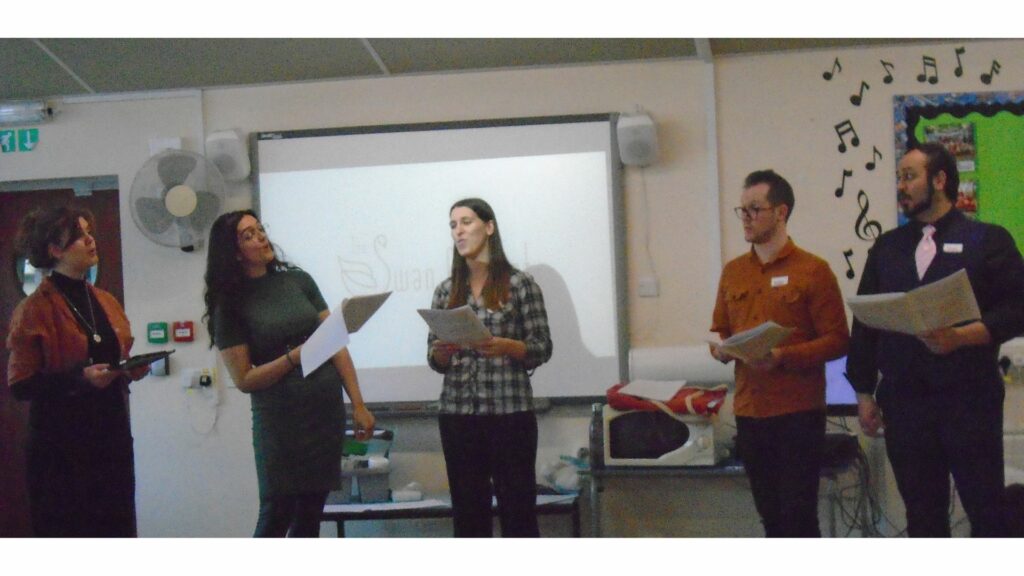
El Cant Dels Ocells
Catalan
Al veure despuntar
el major lluminar
en la nit més ditxosa,
els ocellets cantant,
a festejar-lo van
amb sa veu melindrosa.
Cantava el passerell :
Oh, que hermós i que bell
és l’infant de Maria!
I li respon el tord :
Vençuda n’és la mort,
ja naix la vida mia !
Catalan Traditional
Arrangement: Anita Datta (b.1992)
English Translation
In seeing emerge
The greatest light
During the most celebrated of nights,
The little birds sing.
They go to celebrate Him
With their delicate voices.
The linnet sang,
“Oh, how lovely and beautiful
Is the child of Mary!”
The thrush answers:
“Death is conquered,
My life now begins!”
The melody of this traditional Catalan Christmas Carol was made famous by cellist Pau Casals, who performed it at the start of all of his concerts following his self-imposed exile from Spain in protest at Franco’s dictatorship. For this reason, it has long been identified with Catalunya. This arrangement by Anita Datta sets the haunting melody amidst improvised motifs derived from the calls of the birds named in the complete text, inspired by the approach of Janequin. The first verse is dominated by the tenor voice, in homage to Casals. Tonight’s performance is the premiere of this arrangement, which bears a dedication to Hugo de Camps Mora.
Summer Is Icumen In
Old English
Sumer is icumen in, Lhude sing cuccu.
Growth sed and bloweth med
And springth the wood enu,
Sing cuccu.
Awe bleteth after lomb,
Lhouth after calue cu.
Bulluc sterteth, bucke uerteth,
Murie sing cuccu.
Cuccu, cuccu, Wel singes thu cuccu;
Ne swik thu nauer nu.
Sing cuccu nu, sing cuccu!
Attributed to W. de Wycombe
Modern English
Summer has come in, loudly sing cuccu.
The seed grows, the meadow blows,
And the wood springs anew,
Sing cuccu.
The ewe bleats after the lamb,
Lows after the calf the cow.
Bullock starts, buck farts,
merry sing cuccu.
Cuccu, cuccu, well sing you cuccu,
Do not ever stop now.
Sing cuccu, now. Sing cuccu.
Attributed to W. de Wycombe, this round appears in a manuscript of 1260 with a Latin inscription describing its suitability to be sung by four companions. We are looking forward to singing it together with you!
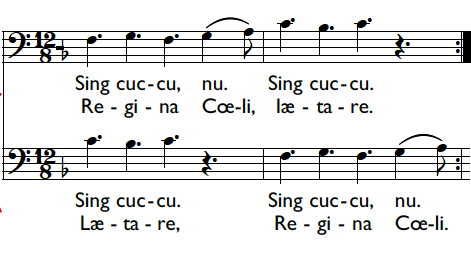
Vagh'Amorosi Augelli
Italian
Vagh’ amorosi augelli
che, sovra gli arbuscelli,
rinovate gl’antichi vostri amori,
cantate tra bei fiori,
gl’occh’e le bionde chiome
che fur si dolce nod’ a le mie some,
e di mia Clori a l’onde,
in quest’ amate sponde,
udite l’armonia
che puo sol’ a dolcir la pena mia
English Translation
Sweet loving little birds,
Which, above the bushes,
Renew your ancient loves,
Sing among beautiful flowers,
[of] the eyes and the blond hair
Who make such a sweet knot in my pains;
And tell my Chloris over the waves,
In these beloved shores,
[to] hear the harmony
That alone can sweeten my pain.
Per Lei Pos'in Oblio
Italian
Per lei pos’ in oblio,
le vag’ e biond’ arene,
tanto gradite, tanto gradite,
tanto gradite al gran popul di Marte,
et ogni pensier mio,
pingend’ in vive carte,
lei sol’ andra per queste piagg’ amene,
e da lei stanc’ e frale,
attend’ ambe due l’ale,
per gir sempre volando,
volando, qual cigno lieto lei
sola cantando sola cantando.
English Translation
For she placed in oblivion,
the fair and blond Arene,
so beloved, so beloved,
so beloved of the great people of Mars,
and every thought of mine,
painted in living form;
she alone will go for these pleasant tears,
and from her weary and frail,
wait for both wings,
to always fly around,
flying, like a happy swan she
alone singing, alone singing.
Come Fra Verd'erbette
Italian
Come fra verd’ erbette,
vag’ augellin in debil filo accolto,
desser ne lacc’in volto,
fin che non s’erg’ a volo mai non sente,
cosi mentr’io presente,
da voi donna mi trovo,
il mio cercer non provo,
ma quand’ haime, da voi fo dipartata,
sveller mi sent’ il cor mancar la vita.
Music: Maddalena Casulana (1544-1590)
English Translation
As amidst green grasses,
a delicate little bird welcomes you,
then flees away not to return,
while he flies but thinks not,
so while I, waiting,
for you, woman, I find,
I try not to turn about,
but when alas, I am departed from you,
in my my heart swells the feeling that life is not worth living.
These three short pieces all come from Maddalena Casulana’s second book of madrigals. Casulana was an italian lutenist, singer and composer, whose first book of madrigals is the first example of a published volume by a sole composer who was a woman. She was friends with Isabella di Medici, who is the dedicatee of many of her works. Her frustration at attitudes towards women in the arts was clear in the inscription at the start of her first book, which ran:
“[I] want to show the world, as much as I can in this profession of music, the vain error of men that they alone possess the gifts of intellect and artistry, and that such gifts are never given to women.”
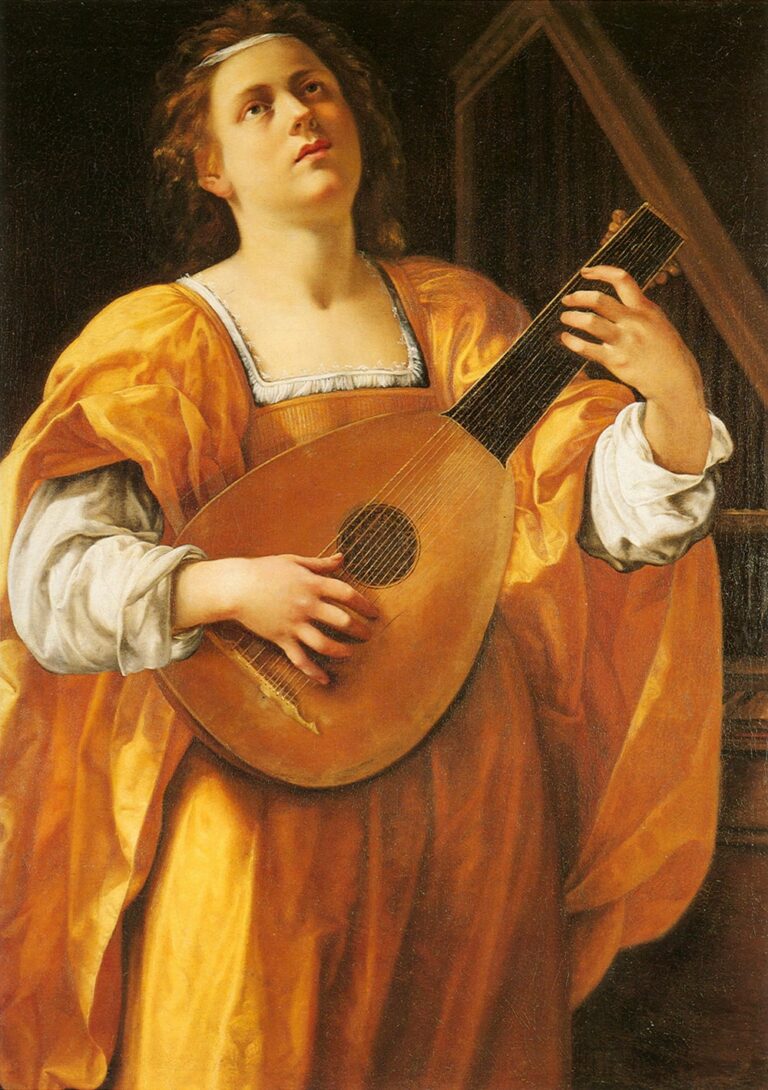
Two Pewits
Under the after-sunset sky
Two pewits sport and cry,
More white than is the moon on high
Riding the dark surge silently;
More black than earth. Their cry
Is the one sound under the sky.
They alone move, now low, now high,
And merrily they cry
To the mischievous Spring sky,
Plunging earthward, tossing high,
Over the ghost who wonders why
So merrily they cry and fly,
Nor choose ‘twixt earth and sky,
While the moon’s quarter silently
Rides, and earth rests as silently.
Words: Edward Thomas (1878-1917)
Music: Howard Skempton (b.1947)
Edward Thomas was a prolific writer across genres including nature, travel and biographical writing, in addition to his output as a poet. His poetry often reflects his attraction to the charms of nature, and the philosophical preoccupation with freedom and liberty precipitated in the public consciousness by the events of World War I. Two Pewits was published in 1915, as Thomas enlisted to serve in the war that would take his life just two years later at the battle of Arras.
In his characteristically concise style, Skempton’s setting of this poem magically evokes the dipping and diving of pewits in flight through attention to quality of sound, their highs and lows tracing the vagaries of human emotions and inspiring wonder.
Good Morrow
Pack clouds away and welcome day,
With night we banish sorrow;
Sweet air, blow soft, mount larks aloft
To give my love good morrow.
Wings from the wind to please her mind,
Notes from the lark I’ll borrow;
Bird, prune thy wing, nightingale, sing,
To give my love good morrow.
Wake from thy nest, Robin Redbreast,
Sing birds in every furrow;
And from each hill, let music shrill
Give my fair love good-morrow!
Blackbird and thrush in every bush,
Stare, linnet, and cock-sparrow.
You pretty elves, amongst yourselves,
Sing my fair love good morrow.
Words: Thomas Heywood (1575-1641)
Music: Agnes Zimmerman (1847-1925)
Thomas Heywood was a playwright, actor and key figure in the Elizabethan and Jacobean theatre. This poem follows in the contemporary tradition of the metaphysical poem, relying on extended metaphors to conjure meaning. It is possible that the poem was influenced by, or influenced, John Donne’s famous sonnet of the same name.
Zimmerman’s charming part-song takes the tropse of the text as an aubade, a love song at dawn. Listen for bird-like soprano lines, and emotive swelling harmonies at the end of phrases.
Gone Forever
O happy rosebud blooming
Upon thy parent tree,
Nay, thou art too presuming
For soon the earth entombing
Thy faded charms shall be,
And the chill damp consuming.
O happy skylark springing
Up to the broad blue sky,
Too fearless in thy winging,
Too gladsome in thy singing,
Thou also soon shalt lie
Where no sweet notes are ringing.
And through life’s shine and shower
We shall have joy and pain;
But in the summer bower,
And at the morning hour,
We still shall look in vain
For the same bird and flower.
Words: Christina Rossetti (1830-1894)
Music: Agnes Zimmerman (1847-1925)
Christina Rossetti is perhaps one of England’s most famous poets, the author of the text of In The Bleak Midwinter and a great many other notable hymns and elegies.
This setting of her work by Zimmerman was published in 1874 in a compendium by Novello, and Rossetti would surely have been aware of it. She would also have known Zimmerman, the enigmatic German pianist and composer who lived most of her life in England.
Zimmerman was enrolled at the Royal Academy of Music when she was just nine years old. She received the Kings Scholarship in 1860, and made her solo piano debut performing Beethoven’s Emperor piano concerto at Crystal Palace aged just 16. She toured internationally after the completion of her studies, and then moved in with feminist philanthropist Lady Louisa Goldsmid, to whom she was devoted for 18 years, and with whom it is speculated that she shared a romantic relationship. Goldsmid is notable for her philanthropic funding of piano scholarships for women, and her involvement in the campaign to open the Cambridge Tripos to women. Zimmerman died in London in 1925.
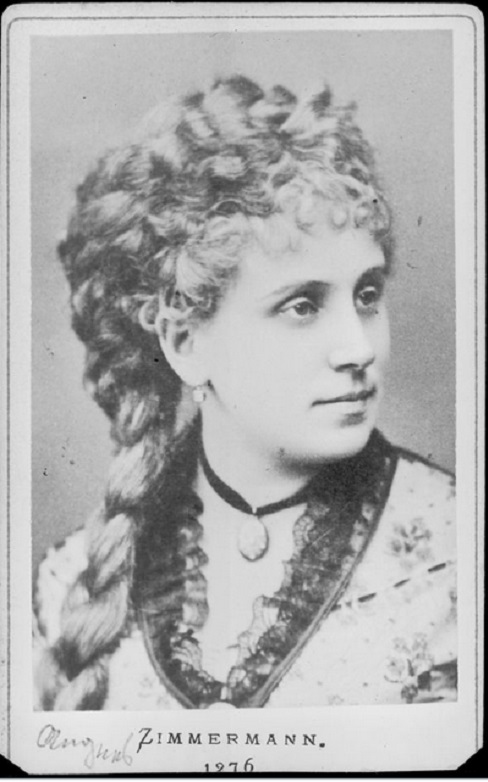
Owls (An Epitaph)
What is that?…Nothing;
The leaves must fall, and falling, rustle;
That is all;
They are dead
As they fall, –
Dead at the foot of the tree;
All that can be is said. …
What is it? …Nothing;
What is that?…Nothing;
A wild thing hurt but mourns in the night,
And it cries
In its dread,
Till it lies
Dead at the foot of the tree;
All that can be is said.
What is it? …Nothing;
What is that? …Ah!
A marching slow of unseen feet,
That is all:
But a bier, spread
With a pall,
Is now at the foot of the tree;
All that could be said;
Is it… what. …Nothing.
Words and Music: Edward Elgar (1857-1934)
Elgar is a composer most readily associated with Victorian British pomp and grandeur. The intimacy of this most personal of his works challenges that perception. Fragmented, dissonant, sparse and decidedly modernist, Owls (An Epitaph) is the composer’s reflection on the haunting beauty of mortality and ‘nothingness’.
Published in 1907 in a set of four songs, Elgar smuggles in the only example of his own text alongside poems of secrets and death elaborated through natural metaphors by Tennyson, Byron and Shelley.
Northern White Faced Owl

The Nightingale
The nightingale so pleasant and so gay,
In greenwood groves delights to make his dwelling,
In fields to fly chanting his roundelay,
At liberty against the cage rebelling.
But my poor heart with sorrows overswelling,
Through bondage vile, binding my freedom short,
No pleasure takes in these his sports excelling,
Nor of his song receiveth no comfort.
English Text from Musica Transalpina (1588)
Le rossignol plaisant et gracieulx,
Habiter veult toujours au vert bocage:
Aux champs voler et par tous aultres lieux
Sa liberte aymant plus que la caige.
Mais le mien cueur qui demeure en hostaige,
Soubz triste dueil qui le tient en ses lacs.
Du rossignol ne cherche ladvantaige
Ne de son chant recepvoir le soulas.
Original French Text from
La fleur de Poésie françoyse (1543)
Despite (or perhaps because of) his name, William Byrd wrote precious few pieces mentioning our feathered friends. It is perhaps particularly poignant, then, that here he depicts a bird trapped in a cage, rebelling against the strictures in which he finds himself. Identifying with the captive nightingale, which receives no comfort from its own sweet song, we can be left in no doubt that the Catholic recusant Byrd is here confessing to his own feelings of pain and suppression under the protestant culture of his day. As so often in the works of minoritised composers, it is here in the honesty of his secular music that we gain insight into the emotional life-world of the person who we most often encounter in the formal sacred polyphony for which he is most famous.
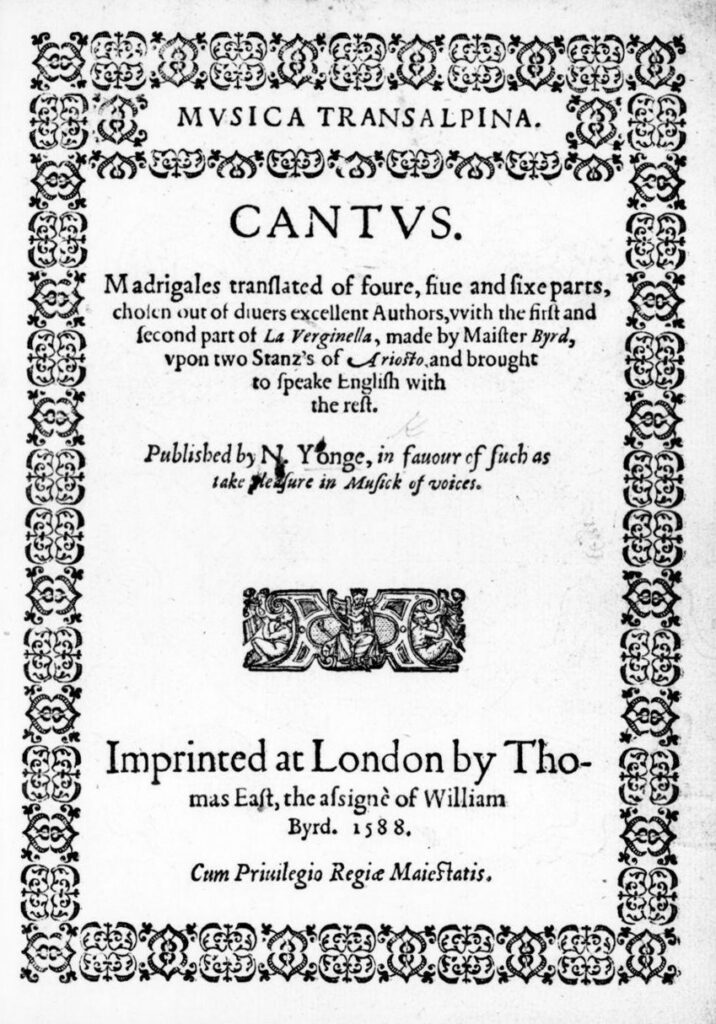
Like As The Doleful Dove
Like as the doleful dove delights alone to be,
and doth refuse the bloomed branch, choosing the leafless tree,
where on wailing his chance, his bitter tears besprent,
doth with his bill his tender breast oft pierce and all to rent;
whose grievous groanings though, whose grips of pining pain,
whose ghastly looks, whose bloody streams outflowing from each vein,
whose falling from the tree, whose panting on the ground,
examples be of mine estate, though there appear no wound.
This part song is a reconstruction from the only surviving sources, a keyboard arrangement in a musical commonplace book known as ‘The Mulliner Book’, which was probably compiled between 1650-1575. The song is referenced also in John Hawkins’ 1775 ‘A History of Music’, but otherwise has been lost in its original form.
Listen for the simple lilting phrases, that echo the melancholic cooing of a turtle dove.
Be Like The Bird
English Translation
Be like the bird, that
Pausing in her flight awhile
On bough too slight
Feels it give way beneath her,
And sings, and sings, and sing
Knowing she hath wings.
Original French
Soyez comme l’oiseau, posé pour un instant
Sur des rameaux trop frêles,
Qui sent ployer la branche et qui chante pourtant,
Sachant qu’il a des ailes!
Words: Victor Hugo (1802-1885)
Music: Abbie Betinis (b.1980)
Abbie Betinis is an American composer based in New York. Of this short and sweet piece, she says:
“I wrote this canon just after completing cancer treatment for the second time. My family and I sent it out as our annual Christmas card in 2009…
My cousin Sarah Riley and I discovered the text quite by accident. In October 2009, our grandfather, the Rt. Rev. John H. Burt (a.k.a Christmas reveler and merry-maker, lover of music and literature, and inspiring leader and activist) had died. After his funeral, and after an impromptu family round-sing (common in the Burt family), Sarah and I were sitting on Grandpa’s old couch, reading through some of the sermons he had written and delivered throughout his long life.
Sarah is co-director of an incredible program called High Rocks, a comprehensive and unique school for girls founded by her mom, Susan Burt, in the mountains of rural West Virginia.
Sarah and I realized that Grandpa had quoted this lovely Victor Hugo text in a few sermons over the years, always to inspire courage in the face of adversity. It struck me as a surprisingly hopeful text befitting a difficult year, but it also moved me to tears to think of the work that my Aunt Susie and now my cousin herself, sitting there next to me on the couch, are doing to change the world — one girl at a time.
So I dedicate this carol to High Rocks for Girls. May High Rocks continue to educate, empower, and inspire each girl to know that “she hath wings.”
A La Claire Fontaine
French
À la claire fontaine
M’en allant promener,
J’ai trouvé l’eau si belle
Que je m’y suis baigné.
Il y a longtemps que je t’aime,
Jamais je ne t’oublierai.
Sous les feuilles d’un chêne (alternate : sur la mousse d’un chêne)
Je me suis fait sécher ;
Sur la plus haute branche
Le rossignol chantait.
Chante, rossignol, chante,
Toi qui as le cœur gai ;
Tu as le cœur à rire,
Moi je l’ai à pleurer.
J’ai perdu mon amie
Sans l’avoir mérité,
Pour un bouquet de roses
Que je lui refusai.
Je voudrais que la rose
Fût encore au rosier,
Et moi et ma maîtresse
Dans les mêmes amitiés.
Il y a longtemps que je t’aime,
Jamais je ne t’oublierai.
Words: Anonymous (Traditional)
Arrangement: Bertold Breig
English Translation
At the clear fountain,
while going for a walk
I found the water so beautiful
that I bathed in it.
I’ve loved you for a long time,
I’ll never forget you.
I lay down to dry
under the leaves of an oak.
On the topmost branch
a nightingale was singing.
Sing, o nightingale, sing,
your heart is merry,
your heart wants to laugh,
mine wants to cry.
I lost my lover
without deserving it
for a posy of roses
I wouldn’t give her
I wish the roses
were still on their bush
and that my beloved
still loved me.
I’ve loved you for a long time,
I’ll never forget you.
À La Claire Fontaine is a traditional French song first emerging in the 15th Century. Although popularly sung as a lullaby or nursery rhyme, the poignant text elaborates a romantic theme in which the singer remembers a lost love, contrasting the joyous song of the nightingale with the pain of their loss. The song has been sung as a resistance anthem by French Canadians, and is especially popular with French speaking populations outside of France.
I Am The Song
I am the song that sings the bird.
I am the leaf that grows the land.
I am the tide that moves the moon.
I am the stream that halts the sand.
I am the cloud that drives the storm.
I am the earth that lights the sun.
I am the fire that strikes the stone.
I am the clay that shapes the hand.
I am the word that speaks the man.
Words: Charles Causley (b.1917-2003)
Music: Bernard Hughes (b.1974)
Causley is an award-winning British poet whose straightforward writing style draws influence from folk ballads and vernacular English verse. His punchy, epigrammatic stanza twists creation backwards upon itself, in a start comment on creation from the perspective of The Creator. The simplicity of his approach is reflected in the directness and literal unity of Hughes’ enigmatic setting. The Swan Consort is most grateful to Bernard Hughes for his kind permission to perform his works this evening, and his unfailing friendship for our choral family.
Our grateful thanks to Wolfson College Cambridge and Lynette Alcántara for inviting us to perform for you this evening, and thank you for choosing to spend tonight with us.
The Swan Consort is a Registered Charity (1194785). Please consider supporting our work of improving access to the musical arts. Share our work, and tell your friends about tonight! If you wish to make a financial contribution to our charity, speak to Anita or text 5WAN to 70085 to donate £5 at any time.

